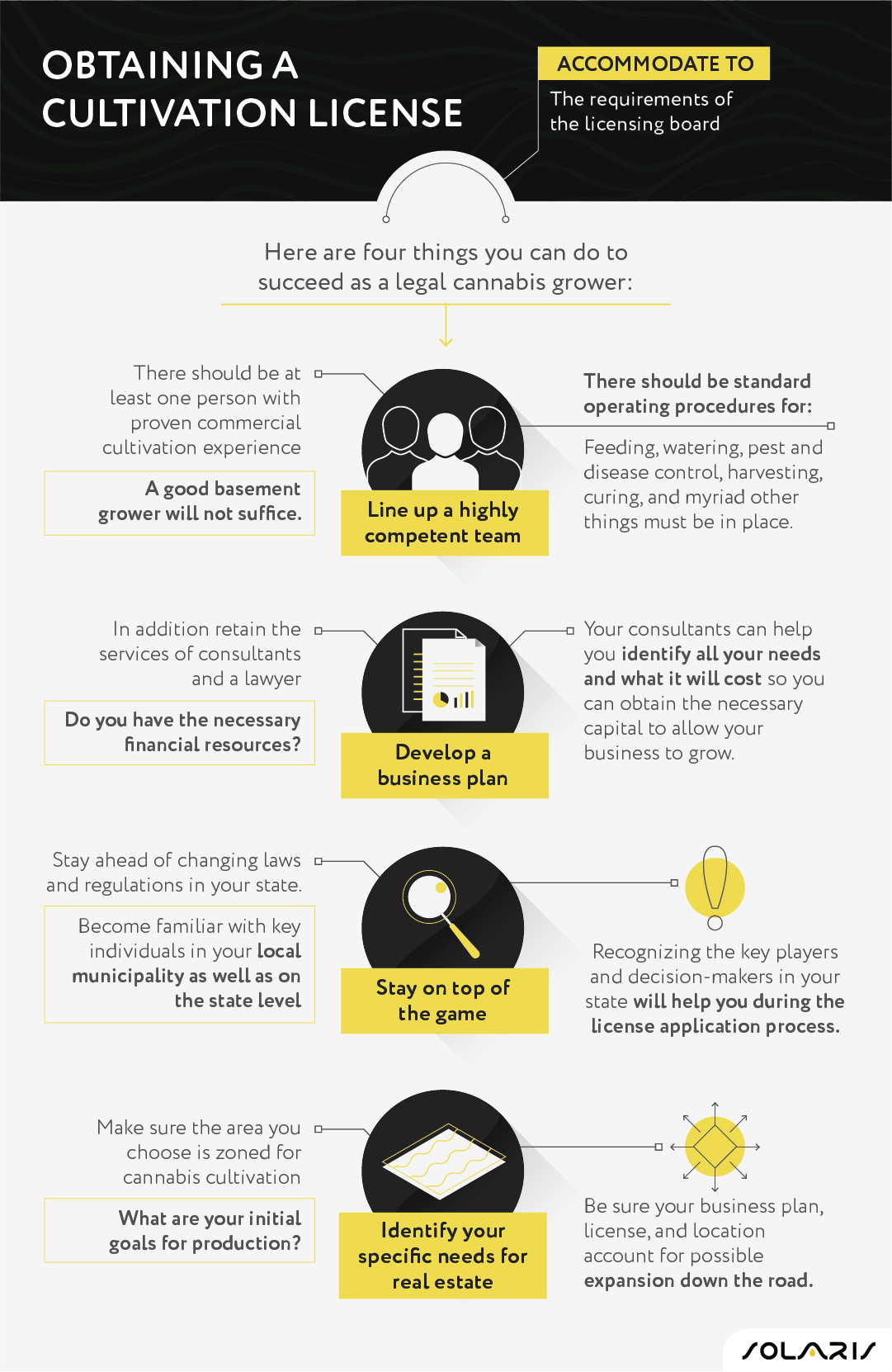Growing cannabis legally and starting a business are attractive pursuits for many who want to follow their dreams and make a good living doing so. As the industry evolves, it is becoming increasingly difficult to accomplish this goal.
Passion for cultivating the plant is not enough. Those who are successful in winning a marijuana cultivation license need to learn more about approaching it as a business rather than just a hobby.
Although most states do allow the cultivation of cannabis crops for personal use, for those who would like to make a business out of their growing experience, the proper licensing and regulation is necessary.
Running a medical cannabis operation is not for everyone, but if done the right way, it can prove to be profitable.
State by state regulation
The first step to starting a weed cultivation business is by understanding your state laws involving cannabis. State laws determine who may cultivate cannabis and under what conditions they may do so.
At the outset, it should be noted that the cultivation and sale of marijuana are still considered federal crimes, and whatever efforts are made to comply with state and local laws will not prevent you from being prosecuted under federal law. Regardless, those starting a weed business can avoid most serious problems by closely following state and local rules.
Not all legal marijuana states are accepting applications either, so it is important to keep up on updates where you live and see if the timing is right for your application to await approval. The acceptance of applications on a state-by-state basis is always changing.
For example, the Department of Licensing and Regulatory Affairs in Michigan is currently accepting applications for growers. However, the state of Washington is not accepting applications.
Currently, Oregon’s already licensed growers are meeting consumer demands within the state. Therefore, the commission will no longer process new producer licenses until after January 2, 2022, unless demand changes.
However, if you are buying a cannabis production company and license from someone else, this rule does not apply. Simply submit a “Change of Ownership” to the Oregon Liquor Control Commission to complete the purchase.
Because most regions have limited spots, your application must stand out. Even those who are passionate about their company and its purpose are not guaranteed a way in. Be sure to have all the required documents in place; every state wants something different in their applications. Most states also have timelines in which the application must be submitted.
License fees
Like regulation, the fees for licenses vary greatly. In Washington state, application fees for a license are only $250, with annual license fees at $1,480. This is a bargain compared to most other states.
In Illinois, the application fee is $25,000, with an annual cultivation license that costs $100,000. Some states, such as California, Colorado, and Oregon, have tiered annual application and license fees that depend on the size and type of grow. For example, if you plan to grow indoors or outdoors, the number of plants you will grow, etc.
Obtaining a cultivation license

To become a legal cannabis grower, accommodating every requirement of the licensing board is mandatory to obtain a license. Here are four things you can do to succeed as a legal cannabis grower:
- Line up a highly competent team. Your team should have at least one person with proven commercial cultivation experience, not necessarily with cannabis but in any other commercial growing endeavor, whether it be ornamental flowers, fruits, or vegetables, preferably with a college degree in botany or horticulture. A good basement grower will not suffice. Growing for yourself and growing for a commercial market on a massive scale are two entirely different things. A solid plan with standard operating procedures for feeding, watering, pest and disease control, harvesting, curing, and myriad other things must be in place. Your floorplan and facility design must be exemplary and precise environmental control is a must.
- Develop a business plan. Besides having a thorough and highly detailed business plan in place, retain the services of consultants and a lawyer. Legal marijuana cultivation is an extremely competitive, regulated, and scrutinized industry. Realize that you will need to pay for your highly competent staff. Do you have the necessary financial resources? Your consultants can help you identify all your needs and what it will cost so you can obtain the necessary capital to allow your business to grow.
- Stay ahead of changing laws and regulations in your state. In many ways, the cannabis industry is still evolving in an effort to meet and address variables that continue to emerge. Become familiar with key individuals in your local municipality as well as on the state level. Recognizing the key players and decision-makers in your state will help you during the license application process.
- Identify your specific needs for real estate. Make sure the area you choose to set up shop is zoned for cannabis cultivation. Be sure your business plan, license, and location account for possible expansion down the road. What are your initial goals for production? Doing some rough math and researching specific strains and their yield will allow you to comprehend the amount of space you may need. Cannabis requires a lot of water and energy to flourish. Will your operation rely on hydroponics or soil cultivation? Try to get as close as you can to determine ongoing costs for the necessary resources.
License boards will expect you to have all of this information accounted for when applying for a license to grow. It is important to realize that this process will take some investing, planning, and waiting. Do everything you can to make your business proposal unique and superior to those of other applicants. You want to stand out from the crowd, not get lost in it.
Joining an established cultivation business
Another option for getting involved in legal cannabis cultivation is to join an established company and put your skillset into action. You may not reap the same financial dividends, but you also will not have sole responsibility for compliance and regulations.
An academic degree in the cultivation field will no doubt help your chances of gaining employment, but familiarity with the plant will be an asset if you decide to join an operation that is already up and running. In this case, even a basic growing experience will help you. You will have the opportunity to expand your knowledge as it applies to a large, commercial operation.
Based on your experience level and the needs of the company at the time of your hire, your position could range from entry-level cultivation to more of a leadership position. Many companies promote from within their team because of familiarity with their methods of operation.
This type of work also makes you a more likely candidate for acquiring a cultivation license at a later date if that is your goal. Having a thorough knowledge of your craft is important.
What is a master grower?
As more states change their medicinal and recreational marijuana laws, the role of a master grower has legitimized in the industry.
A master grower is someone who has the experience and education necessary to cultivate cannabis on an industrial scale. A master grower has the in-depth knowledge necessary to thoroughly understand the entire life cycle of the cannabis plant, as well as the light, water, and nutrients necessary for various strains.
They know how to grow both hydroponically and in soil, indoors and outdoors. They have perfected the art of cloning their plants and understand every variable that must be accounted for in producing a successful crop.
A master grower has a long list of responsibilities. They need an extensive horticulture background as well as managerial skills.
The duties of a master grower include:
- Extensive knowledge of garden maintenance plus grow and trim rooms.
- Able to work in collaboration with other experts.
- Responsible for hiring and firing employees.
- Expert in plant soil, nutrients, and pH levels.
- Pest control (including identifying different pests and problems).
- Understanding the light requirements for each plant.
- Crop control (proper temperature, humidity, and ventilation).
Based on different variables, the average salary of a master grower is about $90,000 a year. Some of the larger cannabis companies pay their Master Growers up to $150,000.


